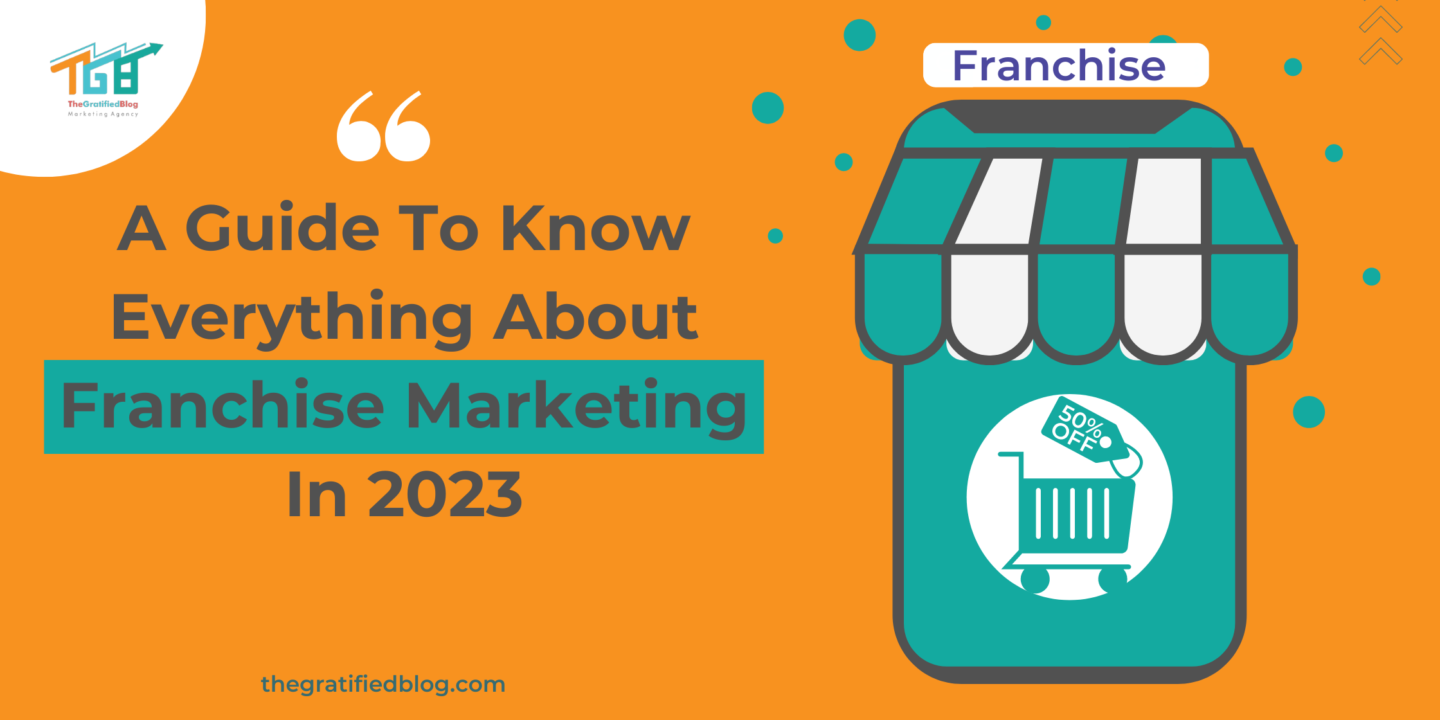
As markets become increasingly global, businesses must expand their offline and online presence to meet the rising needs of consumers.
To do this effectively, many companies have taken to franchising – allowing them to maximize their reach without investing in excessive resources. With such a widespread network comes excellent responsibility; brands now require an effective Franchise Marketing system that ensures uniformity in product and service representation across all franchises!
As the model has grown in popularity, so too needs Franchise Marketing. So, in this article, we will explore everything about franchise marketing.
Franchise And Franchise Marketing
A Franchise is an agreement between two parties in which one party (the franchiser) grants the right to use its trademark and the system of doing business to another party (the Franchisee).
In return, the Franchisee pays the franchiser an initial fee and royalties over some time as part of the agreement.
Franchise Marketing refers to the strategies, efforts, and activities that a franchiser will take to promote the products and services of their franchisees. This system allows brands to maximize their visibility, credibility, and profitability in franchising.
Globally speaking, franchise businesses are exploding, with nearly 300 new companies beginning to operate every year! With this powerful tool, you can stay ahead of the competition while capitalizing on potentially lucrative opportunities.

Pros And Cons Of Franchise Marketing?
Pros:
- Promotes uniformity
It ensures that all franchisees promote the same message and product, allowing for a unified brand experience across all franchised locations.
- Ready-made business models
It comes with ready-made business models you can implement without starting from scratch. This saves time and resources for researching customer needs and designing a marketing plan.
- Less Risky than Independent Businesses
By franchising, you benefit from the expertise and credibility of an established business. As a result, it’s much less risky than starting your independent venture.
- Cost-efficient
Franchising provides an incredible opportunity to capitalize on economies of scale, enabling franchisers to access resources at a discounted price.
- Maximizes Visibility
It unlocks regions and markets that would remain untapped for many businesses, allowing them to access new potential customers.
Cons:
- Loss of autonomy
As a franchisee, you are restricted to the marketing approaches, services, and products authorized by your franchiser. This makes it difficult for you to stand out from other rivals or take advantage of novel opportunities in the market.
- High Startup Costs
It can be costly, with an expensive initial investment as the primary financial burden. On top of that, you must factor in royalty fees and training costs to come up with your total expenditure.
This is too much money for some businesses to invest immediately, making franchising difficult or impossible.
- Regulatory Procedures
Franchisors must abide by complex legal and regulatory procedures. Failing to do so could result in severe penalties, as can non-compliance with the terms of a Franchising Agreement.
- Difficult to Manage Multiple Franchisees
It can be complicated to navigate the complexities of managing multiple franchisees and their respective geographical locations. Keeping each entity in compliance with the terms of the agreement is often laborious yet necessary to ensure business success.
components And Marketing Plans of franchising marketing
Franchising marketing involves various components and marketing plans to effectively promote franchise opportunities and grow the network. Here are key elements and plans typically included:
Components Of Franchising Marketing
Franchising marketing consists of several components that promote a franchise opportunity and attract potential franchisees. Here are some key elements:
- Branding and Positioning: Establishing a solid brand identity is crucial in franchising marketing. This involves creating a recognizable brand name, logo, and visual identity that conveys the unique value proposition of the franchise. Positioning the franchise within the market, highlighting its unique selling points, and differentiating it from competitors are also important aspects of branding.
- Franchise Offering Documentation: Franchisors develop comprehensive documentation to present the franchise opportunity to potential franchisees. This typically includes the Franchise Disclosure Document (FDD), which contains legal and financial information about the franchise, the franchise agreement, operations manual, and other supporting materials that outline the franchisor and franchisee’s rights, responsibilities, and expectations.
- Lead Generation: Generating leads is a critical component of franchising marketing. Franchisors employ various strategies to attract potential franchisees, such as online lead capture forms on their website, lead generation campaigns, advertising, trade shows, and referrals. The goal is to generate a pool of interested individuals who can be nurtured and qualified as potential franchisees.
- Franchise Recruitment: Once leads are generated, franchisors engage in franchise recruitment efforts to convert qualified leads into franchisees. This involves a systematic process of screening and evaluating candidates, conducting interviews, providing additional information, and guiding potential franchisees through the decision-making and onboarding.
- Marketing Collateral and Materials: Franchisors create marketing materials to support recruitment and provide information to potential franchisees. These materials may include brochures, presentations, videos, case studies, success stories, and testimonials that highlight the benefits and success of the franchise. These materials are designed to educate and persuade potential franchisees about the viability and profitability of the opportunity.
- Training and Support Programs: Franchising marketing also includes highlighting the training and support programs provided to franchisees. This can involve showcasing the initial training programs, ongoing support, operational guidance, marketing support, and other resources available to help franchisees succeed in their businesses. Effective communication of these programs helps instil confidence in potential franchisees and demonstrates the franchisor’s commitment to their success.
- Online Presence and Digital Marketing: In today’s digital age, solid online presence is essential for franchising marketing. This includes creating and maintaining a professional website that provides detailed information about the franchise opportunity, utilizing social media platforms to engage with potential franchisees, implementing search engine optimization (SEO) strategies to increase visibility in search results, and utilizing online advertising channels to reach a wider audience.
These components create a comprehensive franchising marketing strategy that effectively promotes the franchise opportunity, generates interest, and attracts qualified individuals interested in becoming franchisees.
Marketing Plans Of Franchising Marketing
Don’t let Franchise Marketing overwhelm you! Here are some helpful steps to build an exceptional marketing plan:
- Setup, Clear Brand Guidelines
Creating clear, easy-to-understand brand guidelines for a successful franchise marketing strategy. To guarantee proper implementation of the methods outlined in these guides.
The guidebook should be divided into distinct sections, such as an informative overview describing your Franchise’s identity; this includes its history, goals, ambitions, and even core values.
This way, all franchisees can better understand what it takes to manage their business effectively within the parameters set by your company!
- Know Your Target Audience
Understanding who you’re targeting is vital for any successful franchise marketing plan. Researching the types of customers likely to be interested in your product or service can help you create tailored campaigns that appeal to them.
By understanding their needs and preferences, relevant and engaging content can be created – this will maximize the returns of your endeavours.
- Take Benefit Of Content Marketing
As you know, Content Marketing is an effective way for franchises to reach potential customers and build a solid online presence.
This process involves creating informative and visually appealing content to inform and entertain viewers and promote critical messages from vendors.
Content such as blog posts, videos, infographics, and webinars can provide helpful information about what makes your Franchise unique while enticing people to explore further and buy.
- Utilize Local SEO
In today’s digital era, local marketing is necessary for Franchise success.
Through localized search engine optimization (SEO), franchisors can effectively reach their target audience and make their brand known in a particular geographic area.
Utilizing this powerful tool, franchisees are armed with the necessary resources to amplify their customer base and escalate sales!
By examining the phrases consumers use when looking for particular items or services in your area, you can guarantee that your Franchisee appears higher on search engine results pages – leading to greater visibility and conversions.
- Personalize Your Marketing
This can either make or break your franchisee marketing plan. Because
No matter what your marketing strategy or objectives are? You must make sure that customers feel special and appreciated.
The best way to do this is by creating personalized campaigns explicitly designed to meet the demands of consumers and potential franchisees.
Send tailored messages and offers that depend on individual preferences to establish strong relationships with your targeted audience – whether through segmentation or dynamic content that adapts according to the customer profile.
- Tell Your Brand Story
Customers are fascinated and captivated by brands that vividly picture their stories.
Utilizing storytelling is an effective way to illustrate why your business should be the chosen one among competitors.
By crafting engaging stories that evoke emotions in viewers, you can form an emotional connection between the customer and your brand – this will make it easier for them to feel comfortable doing business with you!
Furthermore, stories can also help create an image and a personality for your brand — so make sure to use them strategically.
You should include these crucial components in your Franchisee marketing approach for guaranteed success.

Examples of Franchise Marketing Campaigns
Certainly! Here are three outstanding examples of franchise marketing campaigns:
Subway’s “Sub of the Day” Campaign
Subway, the globally recognized sandwich franchise, launched the “Sub of the Day” campaign to drive customer traffic and increase sales. The campaign offered a different sub sandwich at a discounted price each day of the week. Subway effectively promoted this campaign through various channels, including television commercials, radio ads, in-store signage, and social media platforms. The clear and consistent messaging and attractive pricing created a sense of customer anticipation and encouraged them to visit Subway regularly. The “Sub of the Day” campaign increased footfall and boosted overall sales for Subway franchisees.

Domino’s Pizza’s “Pizza Turnaround” Campaign
Domino’s Pizza, a global pizza delivery franchise, implemented the “Pizza Turnaround” campaign to address customer feedback about the quality of their pizza. The campaign involved an honest and transparent approach, admitting the shortcomings of their pizza and highlighting the steps they took to improve it. Domino’s launched a series of commercials featuring employees discussing the changes made to their recipes and ingredients. The campaign successfully conveyed that Domino’s listened to customer concerns and was committed to delivering better-quality pizzas. The “Pizza Turnaround” campaign not only restored customer confidence but also positioned Domino’s as a brand that values customer feedback and continuously strives for improvement

McDonald’s
McDonald’s is another well-known fast-food franchise that has implemented successful marketing strategies. One of their notable campaigns was the “I’m Lovin’ It” campaign, which featured a memorable jingle and emphasized the positive experiences associated with the brand. This campaign helped reinforce McDonald’s brand identity and resonated with consumers worldwide. McDonald’s also engages in localized marketing efforts, adapting their menus and promotions to suit regional preferences, demonstrating their understanding of local markets and appealing to potential franchisees in different regions

These examples demonstrate the power of effective franchise marketing campaigns in generating brand awareness, increasing customer engagement, and driving sales. Successful campaigns often leverage clear messaging, innovative approaches, and a deep understanding of the target audience to create a lasting impact. By consistently delivering value and fostering a sense of community, franchise brands can establish strong connections with customers and build a loyal customer base.
Conclusion: Now that you know the fundamentals of Franchise Marketing, you can set out to create a successful plan for your own business. Remember that success often arrives from understanding and catering to the needs of your target audience.
By following these steps and staying consistent with your efforts, you can ensure your Franchise achieves its desired results! Good luck!
If you have any questions related to the topic, please leave them in the comment section. We will be happy to answer you.
Thanks for reading 🙂








No Comments